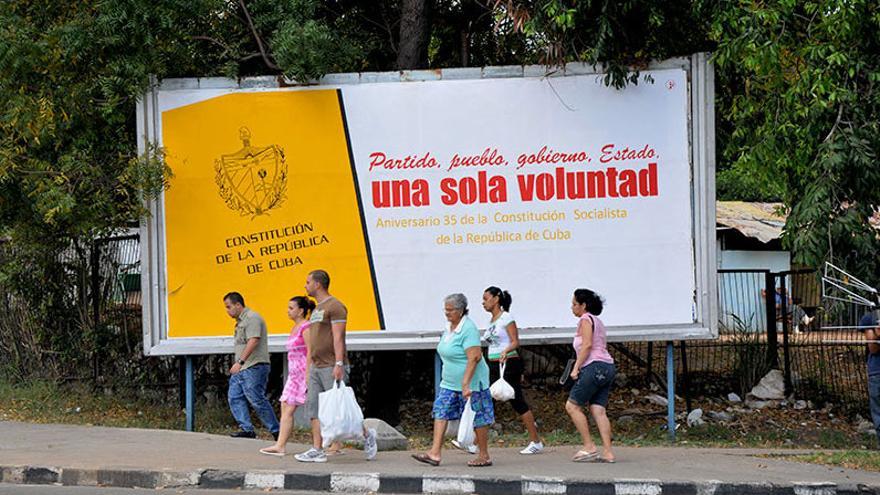
![]() 14ymedio, Reinaldo Escobar, Havana, 20 April 2019 — As of April 10th the new Constitution is an accomplished fact. Although some equate it with the statutes of a party, compare it with prison regulations or identify it as “an old woman with some rouge,” it is already mandatory for everyone.
14ymedio, Reinaldo Escobar, Havana, 20 April 2019 — As of April 10th the new Constitution is an accomplished fact. Although some equate it with the statutes of a party, compare it with prison regulations or identify it as “an old woman with some rouge,” it is already mandatory for everyone.
Regardless of the irritation provoked by Article 4, which supports the irreversibility of the system, known as Article 5, which establishes the dictatorship of the only party allowed, there are some articles that can be described as positive, provided that end of being followed to the letter of the law.
For example, Article 10 serves to remind state officials that they are obliged to “respect, respond and answer to the people” and, in almost any case, one can appeal to Article 41 which states that the Cuban State “recognizes and guarantees each person the enjoyment and the inalienable, imprescriptible, indivisible, universal and interdependent exercise of human rights.”
Even if a Cuban is publicly recognized as an absolute opponent of the regime and has broadcast to the four winds his rejection of the new Constitution, he has the right to rely on its provisions, even if he does not believe in it and does so only to demonstrate the falsity of its postulates.
If a television program such as Cuba’s Reasons shoots down the reputation of a political opponent, activist or independent journalist, they could call on existence of Article 41 that explicitly states: “All people have the right to have their personal and family privacy respected, their own image and voice, their honor and personal identity.”
When the police break into a house without showing the occupant a search warrant and seize the computers, cameras, telephones and documents, the victim of the assault will have the right to demand that the government follow Articles 49 and 50 that consecrate the inviolability of the domicile and its contents and, in addition, may invoke Article 59, which states that “the confiscation of property is applied only as a sanction ordered by a competent authority, in the processes and by the procedures determined by law.”
The same can be applied to by all those who suffer arbitrary detentions, including beatings, because they will be protected by Article 51, which prohibits people from “being subjected to enforced disappearance, torture or cruel, inhuman or degrading treatment or punishment.” They will also be covered by Article 96, which grants them the right, “to establish a habeas corpus proceeding before a competent court.”
And when, in front of the immigration window of an airport, a uniformed person says “you can not travel because you are ’regulated’,” or when a citizen is deported from the capital to his province of origin, in both cases he can turn to Article 52, which with all clarity states that “people are free to enter, stay, transit and leave the national territory, change their address or residence, without further limitations than those established by law.”
If a Cuban citizen is involved in a judicial process, he must know that Article 94 in the current Constitution allows him to enjoy a “due process” where he can have legal assistance from the beginning.
It should be noted that, although what is related to judicial matters is clearly expressed in the Constitution, it is likely that it will be necessary to wait until October 2020 for its effective application, since it will be on that date that the Governing Council of the People’s Supreme Court will present Parliament the draft Law of the People’s Courts and the rest of the proposed amendments to the Law on Criminal Procedure, among others.
There are a lot of corners to explore on this issue, such as the constitutional recognition of certain rights, including enjoying adequate housing, accessing personal data in public records, or being compensated when one has been harmed by state officials.
The Constitution of the Republic could become a new “battlefield” especially for Cubans to demand their citizens rights, permanently trampled by those who should have the obligation to defend them.
Double standards or pragmatism? Someday the country may have a constitutional text conceived by democratically elected assembly members. Meanwhile, this is what there is.
The double standard was put into practice by those who rule the country today by imposing the dictatorship of a single party that establishes an irrevocable system and at the same time promises that all human rights will be respected.
___________________
The 14ymedio team is committed to serious journalism that reflects the reality of deep Cuba. Thank you for joining us on this long road. We invite you to continue supporting us, but this time by becoming a member of 14ymedio. Together we can continue to transform journalism in Cuba.
